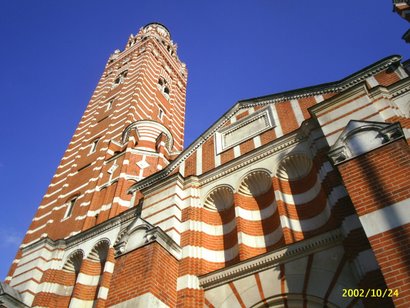O little Town of Bethlehem
 Last night, we held our annual Christmas Celebration, one of the major events of the Cathedral year. In Cardinal Cormac's absence, it was hosted by Bishop Stack.
Last night, we held our annual Christmas Celebration, one of the major events of the Cathedral year. In Cardinal Cormac's absence, it was hosted by Bishop Stack.
The Cardinal is in Bethlehem, with the Archbishop of Canterbury and other religious leaders, on a pilgrimage of prayer to highlight the plight of the town of Our Saviour's birth - the Cardinal himself describes it as a 'pastoral visit to encourage the minority Christian community.' With the tense security situation, the tourist trade which has supported Bethlehem's Chrisitan community has collapsed, and the normally thriving town is almost empty. The Christian inhabitants are harassed and reduced to destitution, and many of them are emigrating. As an aside, the World Monuments Fund wishes to enlist the Church of the Nativity (above) among the ten most endangered buildings in the world.
It is hard to hear such news at any time, but at Christmas the plight of Bethlehem is especially distressing. It is not meant to be this way; as we mark the birth of our Saviour, the little town of Bethlehem should be the epitome of tranquility and beauty - the stuff of Christmas cards, not of news reports. Surely at Christmas, at least, it should sleep in heavenly peace.
Christmas is a time of make-believe; not simply because Bing Crosby tells us that we will all be watching to see if reindeer really know how to fly. There is a serious aspect to our make-believing, for we imagine that this really is a time of peace and goodwill, that the guns will fall silent, the starving will be fed, and the oppressed will be visited with open handed generosity. The truth is, of course, that as we celebrate Christmas, our world is still crucified by war and hunger, by oppression and violence. When the glow of Christmas fades, and the decorations are taken down, the world will look just as it did beforehand.
I remember visiting Bethlehem myself years ago, and being outraged that locals kept trying to sell us souvenirs when our group was attempting to pray at the Church of the Nativity. But then, this is as it always has been, for Christ was born into a world that had no time for him. Despite the angel glory, society did not pause on the day of his birth, and men carried on their commerce with as much greed, pettiness and rage as ever they did. We celebrate our Christmas Day this year at a painful time for the world – even if in the cheer of our homes we don’t switch on the radio to hear it. Much as we adore the Christ child, the rest of the world will scarcely take note.
But Jesus never came to impose himself in that way. So fully did he insert himself into our sinful world, that throughout his life he allowed himself to be the victim of events. This is a God who does not, by and large, tell everyone to shut up and pay attention. Rather, he is a God who quietly accompanies us into the darkest places of our lives. The very manner of his birth is a sign that he shares – rather than overwhelms – the darkest and most difficult moments of our world.
The pain and sadness all about us continues, even on Christmas Day, but we can no longer say that this sorrow has nothing to do with God. As God enters our world on Christmas Day, so he enters every aspect of it, joyful or sorrowful. As God was born into human suffering, so he is born in the life of every human who suffers. Jesus lay in a manger in a Bethlehem that, even in his day just as today, was afflicted with turmoil and strife.
We long for Christmas to be more than make-believe for our world. We wish that humanity would truly live the peace and joy of Christmas, and we join fervently in the words of the Carol, “O hush the din, ye men of strife, and hear the angels sing.” We must strive to make it so. But even as we do, we must recognize that something more important has happened. God is with us, however sinful we may be, born into suffering Bethlehem and our war-torn world; and that is not make-believe. That is real.

1 comment:
Wow, thanks so much for this Fr. Mark!
Post a Comment